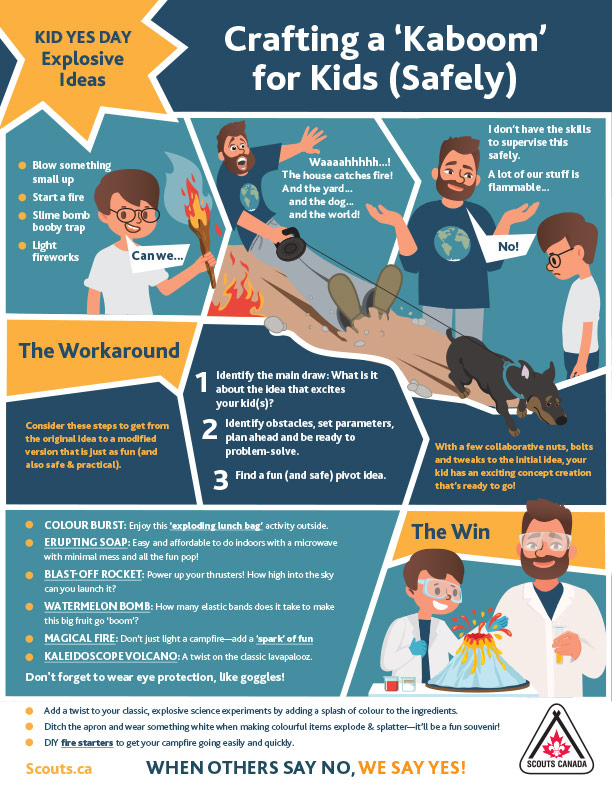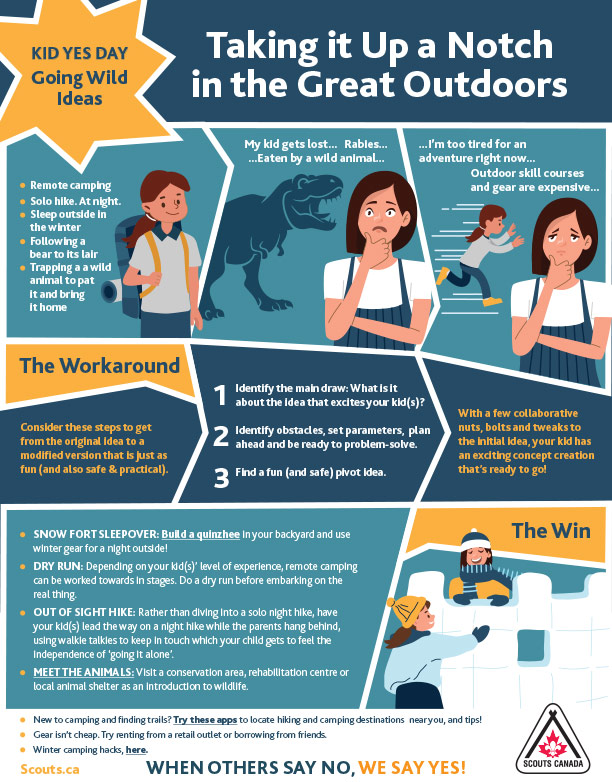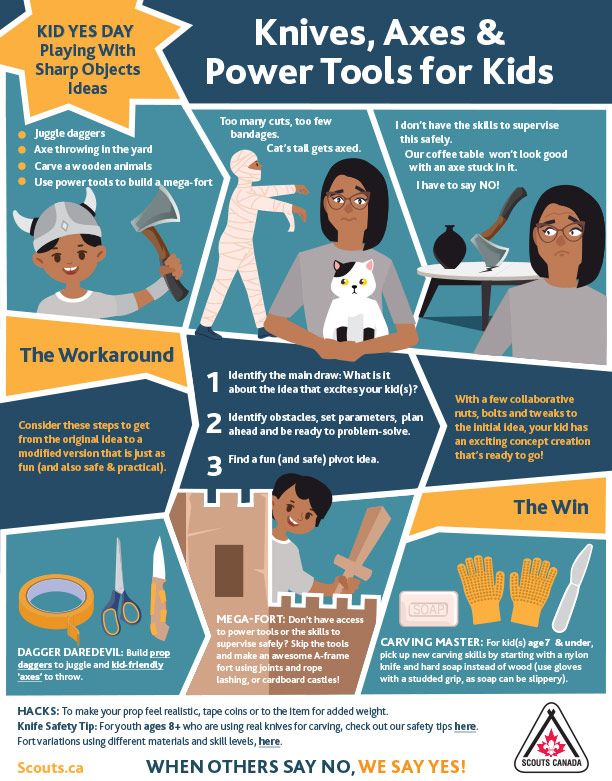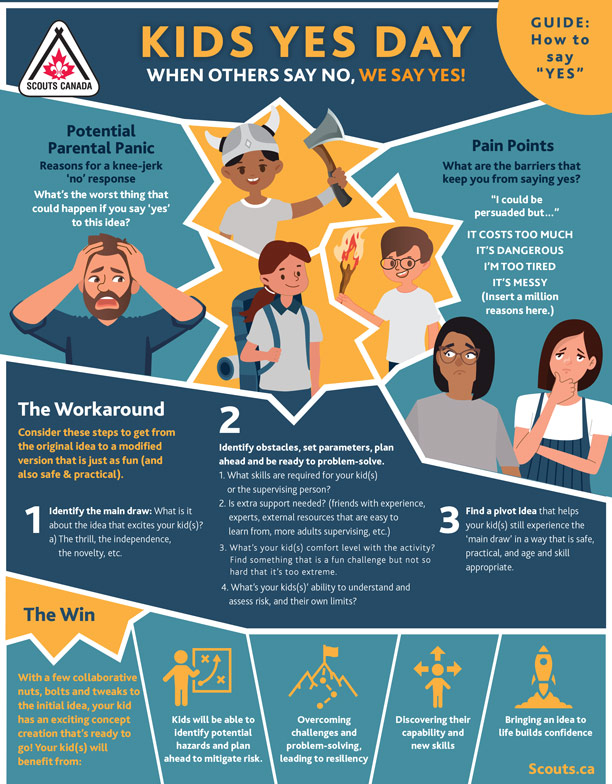National 'Kids Yes Day' Set to Pre-empt Parental Panic with Pro-tips
OTTAWA, ON – MARCH 13, 2023 — Scouts Canada (the country’s leading co-ed youth organization) lives by the approach ‘At Scouts, we say yes when others say no.’ This March 24th (On Canada’s first Kids Yes Day), Scouts Canada wants parents to say YES to kids' requests for fun activities that—without a plan—may seem crazy(ish) at first glance, even slightly risky . To help families across Canada participate in their own Kids Yes Day, volunteer Scouters have offered solid pro tips and hacks to support families in bringing their kids’ zany ideas to life in a way that is age and skill appropriate, safe and most importantly—fun for both the kids and parents!
When parents start with ‘yes, and’, to their kids’ idea, their child is empowered to take the lead, explore new skills and discover their thing. In preparation for Kids Yes Day, Scouts Canada surveyed a focus group of 145 youth (between the ages of 5 and 14) and 368 parent members to determine what activities Canadian kids wish their parents would say ‘yes’ to.
What Kids Want:
When asked which activities they wanted to do the most, kids had many creative responses:
- 55% want to blow stuff up
- 50% want to do extreme outdoor activities (like winter camping, paddling to remote sites or staying a night in the woods alone)
- 44% of kids want to light fireworks
- 44% want to fly an airplane (or spaceship!)
- 42% want to do ‘wacky science experiments’
- 41% want to ride a dirt bike
- 40% want to get close to a lion or other animal (some even want to pet them.)
- 36% would like to light a fire themselves
Kids’ Craziest ideas:
- “Follow a bear to its lair.”
- “Juggle daggers.”
- “Trap a wild animal, pat it … and bring it home.”
How to pre-empt potential parental panic:
Don't knee-jerk a ‘no’ to your kid(s)’ ideas. Find ways to come up with equally fun, modified activities with your kids.
Scouts Canada suggests it’s important to talk to your kids and find out what the most interesting part of the activity is to them. If it’s blowing things up, do they love the BOOM sound? Is it the visual part they love? Is it seeing what’s left of an exploding object?
Identify obstacles, plan ahead, set safe parameters, and set yourself up to problem solve in real-time.
Most importantly, find a pivot idea that helps your kids still experience the ‘main draw’ in a safe, practical way that is age and skill appropriate.
“While parents may have reasonable concerns about cost, time or even mess, there’s no reason that a version of adventure-based requests can’t be done in a completely safe way,” said Mike Eybel, a volunteer Scouter of nine years with Scouts Canada and father of two. “Scouts start from a place of yes; youth can take the lead in coming up with the ideas, planning and actioning them with volunteer Scouters there to support them along the way. This gives youth the opportunity to develop confidence, problem-solving skills and the ability to assess and manage risk for future adventures. Kids Yes Day brings these benefits and pro-tips to all youth in Canada, we're hoping it catches on for years to come.”
To jumpstart the yes’s, Scouts Canada has curated suggestions on how to keep things safe for some of the most popular kid ‘asks’.
From ‘No’ to ‘Yes, and’
 Regardless of your kid(s)’ zany suggestions, we’ve got a process to help you get from their big idea and work towards a modified, skill and age-appropriate version that they can lead for optimal fun.
Regardless of your kid(s)’ zany suggestions, we’ve got a process to help you get from their big idea and work towards a modified, skill and age-appropriate version that they can lead for optimal fun.
Possible Parental Panic — Identify the main reasons for your knee-jerk ‘no’ response. What’s the worst thing that could happen if you say ‘yes’ to their idea? (Ex: the house could catch fire, the coffee table won’t look good with perma-slime stuck on it, the cat’s tail gets chopped off, etc).
Pain Points — What are the barriers that keep you from saying yes? These could range from cost, to the level of risk, to the messiness of the idea, to simply being too tired for the activity—insert a million other reasons here.
The Workaround — Consider these steps to get from the original idea to a modified version that is just as fun (and also safe and practical).
- Identify the main draw: What is it about the idea that excites your kid(s) (is it the thrill, the independence, the novelty, etc.)?
- Identify obstacles, set parameters, plan ahead and be ready to problem-solve.
- What skills are required for your kid(s) or the supervising person?
- Is extra support needed (friends who have experience, experts, external resources that are easy to learn from, more adults supervising, etc.)
- What’s your kid(s) comfort level with the activity? Find something that is a fun challenge but not so hard that it’s too extreme.
- What’s your kids(s)’ ability to understand and assess risk, and their own limits?
- Find a pivot idea that helps your kid(s) still experience the ‘main draw’ in a way that is safe, practical, and age and skill appropriate.
 The Win — With a few collaborative nuts, bolts and tweaks to the initial idea, your kid has an exciting concept creation that’s ready to go!
The Win — With a few collaborative nuts, bolts and tweaks to the initial idea, your kid has an exciting concept creation that’s ready to go!
Your kid(s) will benefit from:
- Kids will be able to identify potential hazards and plan ahead to mitigate risk.
- Overcoming challenges and problem-solving, leading to resiliency
- Discovering their capability
- Bringing an idea to life builds confidence
- New skills
Get Started with these Ideas!
After hosting a focus group to hear what kinds of activities kids want to do—they selected numerous activities, each—the trending ideas were seeing ‘stuff blow up’, getting close to a lion or other wild animal, and doing an extreme outdoor activity (or simply lighting a campfire by themselves).
Using these activities as examples for how to go from a ‘no’ to a ‘yes’, check out these scenarios to help parents bring their kids’ wildest ideas to life (safely)!
Kabooms for Kids
 Of the many ideas they wanted to try, over half the youth in Scouts Canada’s focus group shared an interest in trying explosive activities.
Of the many ideas they wanted to try, over half the youth in Scouts Canada’s focus group shared an interest in trying explosive activities.
Whether it’s lighting fireworks, starting a fire, creating slime-bomb booby traps or whatever your kid(s)’ wacky idea is—here are some ways to craft a ‘kaboom’ with your kid(s), safely.
Possible Parental Panic — Identify the main reasons for your knee-jerk ‘no’ response. What’s the worst thing that could happen if you say ‘yes’ to their idea?
- The house catches fire. And the yard. And the world.
- Dog catches fire.
- Weekend befriending nurses in the ER.
- [insert millions of ‘worst case’ scenarios here].
Pain Points — “I could be persuaded but…”
- Safety concern is an understatement
- I don’t have the skills to supervise this safely
- A lot of our stuff is flammable
- The mess…oh the mess.
The Workaround — Consider these steps to get from the original idea to a modified version that is just as fun (and also safe and practical).
- Identify the main draw: What is it about the idea that excites your kid(s)? The thrill & shock factor, the mess, loud ‘boom’, etc?
- Identify obstacles, set parameters, plan ahead and be ready to problem-solve.
- What skills are required for your kid(s) or the supervising person?
- Is extra support needed (friends who have experience, experts, external resources that are easy to learn from, more adults supervising, etc.)
- What’s your kid(s) comfort level with the activity? Find something that is a fun challenge but not so hard that it’s too extreme.
- What’s your kids(s)’ ability to understand and assess risk, and their own limits?
- Find a pivot idea that helps your kid(s) still experience the ‘main draw’ in a way that is safe, practical, and age and skill appropriate.
Say ‘Yes’ with fun modification ideas (The Win) — With a few collaborative nuts, bolts and tweaks to the initial idea, your kid has an exciting concept creation that’s ready to go!
Safety Tip: Don’t forget to wear eye protection, like goggles!
- Colour Burst: Enjoy this ‘exploding lunch bag’ activity outside.
- Erupting Soap: Easy and affordable to do indoors with a microwave with minimal mess and all the fun pop!
- Kaleidoscope Volcano: A twist on the classic lavapalooz.
- Blast-off Rocket: Power up your thrusters! How high into the sky can you launch it?
- Watermelon Bomb: How many elastic bands does it take to make this big fruit go ‘boom’?
- Magical Fire: Don’t just light a campfire—add a ‘spark’ of fun!
Scout Certified Hacks
- Add a twist to your classic, explosive science experiments by adding a splash of colour to the ingredients.
- Ditch the apron and wear something white when making colourful items explode & splatter—it’ll be a fun souvenir!
- DIY fire starters to get your campfire going easily and quickly.
Going Wild in the Great Outdoors

Of the many ideas they wanted to try, half the youth in Scouts Canada’s focus group shared an interest in taking their outdoor skills up a notch.
From remote backcountry camping to hiking solo at night, to sleeping outside in the winter or even trapping a wild animal to pat it or take it home (let’s not forget one kid’s idea of following a bear to its lair!)—here are some ways to help your child go wild in the great outdoors, safely.
Possible Parental Panic — Identify the main reasons for your knee-jerk ‘no’ response. What’s the worst thing that could happen if you say ‘yes’ to their idea?
- My kid(s) gets lost.
- Eaten by a wild animal.
- Natural selection by the elements (weather mishaps).
- [insert millions of ‘worst case’ scenarios here].
Pain Points — “I could be persuaded but…”
- Safety concern is an understatement
- I don’t have the skills to supervise these activities safely
- Outdoor skill courses and gear are expensive
- I’m too tired for an adventure right now
The Workaround — Consider these steps to get from the original idea to a modified version that is just as fun (and also safe and practical).
- Identify the main draw: What is it about the idea that excites your kid(s)? The thrill, the independence, the physical challenge, the novelty, the curiousity, etc.?
- Identify obstacles, set parameters, plan ahead and be ready to problem-solve.
- What skills are required for your kid(s) or the supervising person?
- Is extra support needed (friends who have experience, experts, external resources that are easy to learn from, more adults supervising, etc.)
- What’s your kid(s) comfort level with the activity? Find something that is a fun challenge but not so hard that it’s too extreme.
- What’s your kids(s)’ ability to understand and assess risk, and their own limits?
- Find a pivot idea that helps your kid(s) still experience the ‘main draw’ in a way that is safe, practical, and age and skill appropriate.
Say ‘Yes’ with fun modification ideas (The Win) — With a few collaborative nuts, bolts and tweaks to the initial idea, your kid has an exciting concept creation that’s ready to go!
- Snow Fort Sleepover: Build a quinzhee in your backyard and use winter gear for a night outside!
- Dry Run: Depending on your kid(s)’ level of experience, remote camping can be worked towards in stages. Do a dry run before embarking on the real thing, find ideas here.
- Out of Sight Hike: Rather than diving into a solo night hike, have your kid(s) lead the way on a night hike while the parents hang behind, using walkie talkies to keep in touch which your child gets to feel the independence of ‘going it alone’.
- Meet the animals: Visit a conservation area, rehabilitation centre or local animal shelter as an introduction to wildlife. Explain that petting is only allowed in clearly marked places and with adult supervision.
Scout Certified Hacks
- New to camping and finding trails? Try these apps to locate hiking and camping destinations near you, and tips!
- Gear isn’t cheap. Try renting from a retail outlet or borrowing from friends.
- Winter camping hacks, here.
Stay Sharp (Knives, Axes, Power Tools—Oh my!)
 After hearing from youth in Scouts Canada’s focus group, some wacky ideas that came to the forefront involved playing with sharp objects.
After hearing from youth in Scouts Canada’s focus group, some wacky ideas that came to the forefront involved playing with sharp objects.
From juggling daggers to axe throwing, using power tools to build a mega-fort, carving wooden animals and more—here are some ways to help your child build new skills and discover their thing, safely.
Possible Parental Panic — Identify the main reasons for your knee-jerk ‘no’ response. What’s the worst thing that could happen if you say ‘yes’ to their idea?
- Too many cuts, too few bandages.
- Cat’s tail gets axed
- The coffee at our local hospital is really bad
- [insert millions of ‘worst case’ scenarios here].
Pain Points — “I could be persuaded but…”
- Safety concern is an understatement
- I don’t have the skills to supervise this safely
- Our coffee table won’t look good with an axe stuck in it
The Workaround — Consider these steps to get from the original idea to a modified version that is just as fun (and also safe and practical).
- Identify the main draw: What is it about the idea that excites your kid(s)? The thrill, the independence of controlling a ‘risky’ item, the novelty, the motion of the activity, etc.
- Identify obstacles, set parameters, plan ahead and be ready to problem-solve.
- What skills are required for your kid(s) or the supervising person?
- Is extra support needed (friends who have experience, experts, external resources that are easy to learn from, more adults supervising, etc.)
- What’s your kid(s) comfort level with the activity? Find something that is a fun challenge but not so hard that it’s too extreme.
- What’s your kids(s)’ ability to understand and assess risk, and their own limits?
- Find a pivot idea that helps your kid(s) still experience the ‘main draw’ in a way that is safe, practical, and age and skill appropriate.
Say ‘Yes’ with fun modification ideas (The Win) — With a few collaborative nuts, bolts and tweaks to the initial idea, your kid has an exciting concept creation that’s ready to go!
- Dagger Daredevil: Build prop daggers to juggle and kid-friendly ‘axes’ to throw.
- Carving Master: For kid(s) age 7 & under, pick up new carving skills by starting with a nylon knife and hard soap instead of wood (use gloves with a studded grip, as soap can be slippery)
- Mega-Fort: Don’t have access to power tools or the skills to supervise safely? Skip the tools and make an awesome A-frame fort using joints and rope lashing, or cardboard castles!
Scout Certified Hacks
EXTEND YOUR ADVENTURE WITH THESE ADDITIONAL ACTIVITIES & SAFETY TIPS:
- Explore 150+ activity ideas for all ages on Scouts Canada’s Activity Finder.
- Catch helpful Safety Tips from the Scouts Canada experts here.
Contact:
Patrick McCaully
Pointman News Creation
patrick@pointmannc.com
Pointmannc.com
-30-
About Scouts Canada
Kids and young adults in Scouts chart their own path of discovery. Through a variety of fun experiences with friends, outdoor adventures and contributions to their community, Scouts build resilience and skills that set them up for life. Scouts Canada is the country’s leading co-ed youth organization, offering programming for children and youth aged 5-26 in multiple languages, reflecting Canada’s multicultural landscape and communities. For more information, visit Scouts.ca.
Scouts Canada is a not-for-profit organization (Charitable Registration No.10776 1694 RR0028) and a member of the World Organization of the Scout Movement.
Safety Tools for Scout Meetings
Toolbox Talks – Take 5 minutes to walk through your safety plan before your adventure
Enterprise Risk Matrix – Identify, mitigate and communicate risks to support smart decision-making
Events Management Playbook – Your Scout Group’s event planning and risk management resources
Kids Yes Day Media Coverage
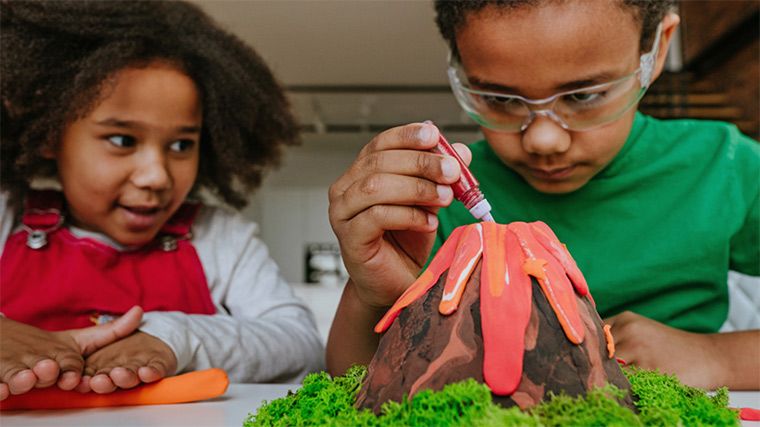
Scouts Canada teaches parents to say yes to kids' wild experiments — CTV News Barrie — March 15, 2023

Kids Yes Day: Watch on CTV News Winnipeg — March 23, 2023
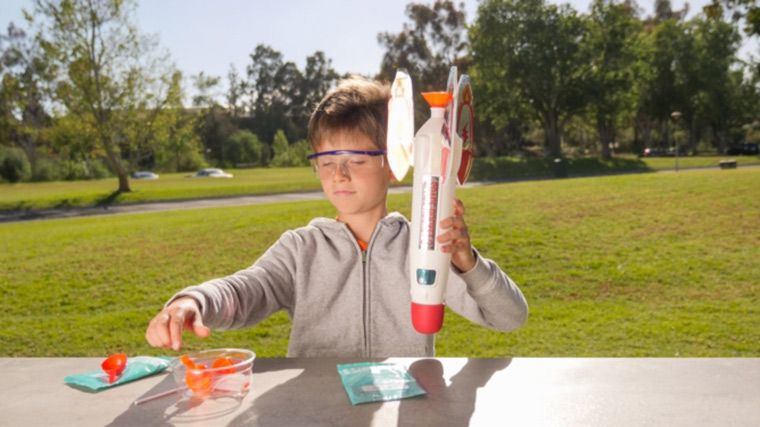
Scouts Canada wants you to say YES to Kids' Crazy(ish) Requests — Cornwall Seeker — March 15, 2023

THIS “YES DAY” SCOUTS CANADA HAS IDEAS ON HOW YOU CAN SAFELY LET YOUR KIDS BLOW STUFF UP — Barrie 360 — March 24, 2023

Listen on AM800 CKLW Radio — March 23, 2023

Kids Yes Day: SCOUTS CANADA WANTS YOU TO SAY YES TO KIDS’ CRAZY(ISH) REQUESTS — cornwallseawaynews.com — March 24, 2023
